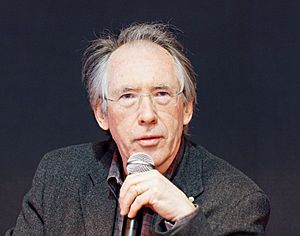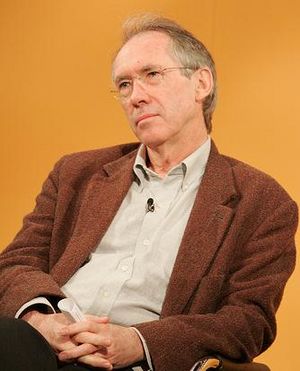Ian McEwan facts for kids
Quick facts for kids
Ian McEwan
|
|
|---|---|

McEwan in 2011
|
|
| Born | Ian Russell McEwan 21 June 1948 Aldershot, Hampshire, England |
| Occupation | Novelist, screenwriter |
| Alma mater | University of Sussex University of East Anglia |
| Period | 1975–present |
| Spouse |
Penny Allen
(m. 1982; div. 1995) |
| Children | 2 |
Ian Russell McEwan (born 21 June 1948) is a famous British writer. He writes novels and screenplays for movies. Many people consider him one of the greatest British writers since 1945. He has won many important awards for his books.
McEwan started his writing career with short stories. His early novels, like The Cement Garden (1978), were sometimes called "dark" or "macabre." Later, his books became very popular. He won the Booker Prize for his novel Amsterdam in 1998. His book Atonement was made into an Oscar-winning movie.
Contents
Early Life and School
Ian McEwan was born in Aldershot, Hampshire, England, on 21 June 1948. His father was a soldier who became a major in the army.
Ian spent much of his childhood in different countries. He lived in East Asia (like Singapore), Germany, and North Africa (like Libya). His family moved a lot because of his father's army job. When he was 12, his family moved back to England. He went to Woolverstone Hall School in Suffolk. Later, he studied English literature at the University of Sussex. He also earned a master's degree in literature from the University of East Anglia.
Writing Career
Early Stories and Novels
McEwan's first published book was a collection of short stories. It was called First Love, Last Rites (1975). This book won an award in 1976. His early novels, The Cement Garden (1978) and The Comfort of Strangers (1981), were made into movies. These books were known for their dark and intense themes. He also wrote a children's book called Rose Blanche in 1985.
Becoming a Popular Author
After 1987, McEwan's writing style changed. He started writing stories that reached more readers. His novel The Innocent (1990) was a spy story set during the Cold War. He also wrote another children's book, The Daydreamer (1994).
His 1997 novel, Enduring Love, was very popular with critics. It was later made into a movie in 2004. In 1998, he won the important Booker Prize for his novel Amsterdam. His next book, Atonement (2001), was highly praised. Time magazine even called it the best novel of 2002. In 2007, Atonement became a successful movie. It starred famous actors like Keira Knightley and James McAvoy.
His novel Saturday (2005) tells the story of one busy day in a neurosurgeon's life. It won the James Tait Black Memorial Prize. On Chesil Beach (2007) was also made into a movie in 2017. McEwan wrote the screenplay for this film himself. He has also written screenplays for other movies and a stage play.
Recent Works and Themes
In March 2010, McEwan published Solar. This novel is about a scientist who wants to save the planet from climate change. McEwan got the idea for this book after a trip to the North Pole. His twelfth novel, Sweet Tooth, came out in 2012. It is a historical novel set in the 1970s. He said it was a way for him to write about his own life in a disguised way.
In 2014, he published The Children Act. This book is about a High Court judge and family law. His 2016 novel, Nutshell, is a shorter story. In April 2019, McEwan released Machines Like Me. This science fiction novel explores artificial intelligence. His novel Lessons was published in 2022. Many critics called it a masterpiece.
Honours and Awards
Ian McEwan has been nominated for the Booker Prize six times. He won the prize for Amsterdam in 1998. He is a member of several important literary groups. These include the Royal Society of Literature and the Royal Society of Arts.
In 1999, he received the annual Shakespeare Prize. He was also made a Commander of the Order of the British Empire (CBE) in 2000 for his contributions to literature. In 2008, University College London gave him an honorary degree.
In 2011, McEwan received the Jerusalem Prize. This award is for people who promote freedom of the individual in society. He decided to donate the prize money to an organization called Combatants for Peace. This group brings together Israeli and Palestinian former fighters.
In 2014, the Harry Ransom Center at the University of Texas bought McEwan's literary archives. These archives include drafts of his novels. In 2020, he was awarded the Goethe Medal. This prize honors non-Germans who have done great work for the German language and international culture. In 2023, he was appointed a Member of the Order of the Companions of Honour (CH) for his services to literature.
Personal Life
McEwan lives in London. He has been married twice. His first marriage was to Penny Allen, and they had two sons. They divorced in 1995. In 1997, he married Annalena McAfee, who is also a writer and journalist.
In 2002, McEwan found out he had a brother who was given up for adoption during World War II. His brother, David Sharp, was born six years before Ian. They have the same mother and father, but David was born before his parents were married. Ian and David are now in regular contact.
Images for kids
See also
 In Spanish: Ian McEwan para niños
In Spanish: Ian McEwan para niños
 | Ernest Everett Just |
 | Mary Jackson |
 | Emmett Chappelle |
 | Marie Maynard Daly |




